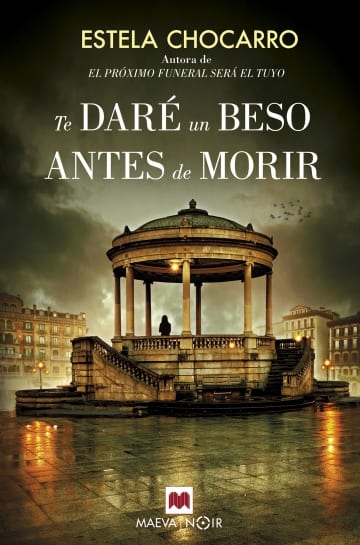
Estela Chocarro: Author of the black series starring Víctor Yoldi and Rebeca Turumbay.
We have the privilege and pleasure of having today on our blog with Estela Chocarro, writer, author of the crime novel series starring journalist Víctor Yoldi and art expert Rebeca Turumbay.
Set in Cárcar, a Navarrese town of just over a thousand inhabitants, this series brings the crime novel to a setting unusual in the genre, the rural, achieving a domestic noir that is original, fresh, different and that hooks the reader.
Actualidad Literatura: Three novels published from your crime series, The Next Funeral Will Be Yours, No one has died in the cathedral y I will give you a kiss before I die. You say that your passion for literature comes from your father, who loved to tell you legends and stories that serve as inspiration. How do those stories end in a crime novel series?
Crash Wake: My father loves to tell stories of “his times” and of the times of others who lived before him. Some of them are simple anecdotes, but the truth is that characters and plots, or parts of them, have inspired me, mainly when I talk about Cárcar and his people. I imagine that my love of storytelling comes from him.
AL: The noir genre is in fashion, but the truth is that within the genreblack river there are many different types of novel. What can readers find in your novels besides gripping crime investigations?
EC: There are more and more subgenres within the black genre, it is true. My novels could fit into Domestic Noir, Local Crime, Rural Noir ... They are stories starring ordinary people who in principle do not have to investigate a crime, but who by circumstances find themselves in a whirlwind that leads them to do so. They are also mainly set in the rural area compared to the traditional Black Novel that is urban. The cast of characters is very varied in terms of their ages and their origins, and I love that because it reflects very well the globalized world in which we move, but also a smaller world that is that of the older people who have always lived in a village.
AL: Your protagonists, Víctor Yoldi and Rebecca Turumbay, are not policemen. Not even detectives. You separate yourself from the usual characters of the Spanish black genre: policemen and civil guards. What does it mean to you when setting up the case that they are two amateur investigators?
EC: I feel much freer, less limited. My protagonists do not have the obligation to act, they do it because something personal is going on with it. I think that the motivation and involvement of someone who intervenes because they have something to lose or a personal motivation is more interesting than that of someone who does it because it is their profession, at least it is more suggestive to me.
AL: All your novels are set, in part, in Cárcar, the town where you grew up. Cárcar has just over a thousand inhabitants and you are making it known throughout Spain. Are the places, streets, bars… where you set your novels real? How do they receive you now in your town when you go?
EC: All the places that appear in the books are real and so are the surnames, sayings and songs, as well as the spirit of the neighbors. The truth is that I go very often. My parents have always lived there and I feel like one more, because it is where I was born and raised. People are happy that the town is the protagonist of the novels, but sometimes I forget that I have a side as a writer and I think there are no differences in the treatment after publishing, except when someone approaches me to ask me for a dedication. or tell me something about one of the books, which I love at the same time that it surprises me, because as I say, I feel the same as always because I am at home.

I'll give you a kiss before I die: Third novel in the crime fiction saga set in the most rural Navarre.
AL: In your novel I'll give you a kiss before I die, you put us fully inside a prison, the new Pamplona prison, considered one of the most luxurious in Spain, where we find a thug with his henchmen who does whatever he wants, beat up, kill and even officials dare to touch it. Is that the reality of life in jail? How does it square with the luxury that public opinion assumes in the Pamplona jail?
EC: As its director told me, it is a new jail that was inaugurated at the height of the economic crisis and that was the reason why some details were seen as an excessive luxury when in reality the jail was similar to the rest from the country. There was a lot of controversy with the indoor pool and plasma TVs, but the truth is that the pool has always been empty and the TVs were never placed. Each inmate must provide himself if he wants to watch TV. As for the prison bully, it is a question of power and in all prisons there are groups and leaders. It is a smaller and more dangerous version of the society we live in.
AL: Your latest novel, I'll give you a kiss before I die, was published last year, in 2017, is there already a fourth underway? Are you one of those who start the next novel as soon as the previous one ends, or do you need a time for creative regeneration?
EC: When I will give you a kiss before dying, the next one was quite advanced, as soon as I put an end to one, I soon needed to find another story that captivated me, I felt like an orphan in some way. However, I believe that each book is different and each moment asks you for something different. My fourth book has already been delivered to the publisher (there is no publication date yet) and I have an idea for the next one, but I am not in as much of a rush to start writing as I have been in the past.
AL: Literary piracy: A platform for new writers to make themselves known or irreparable damage to literary production? Does it prevent writers from making a living selling their books?
EC: I'm sure there is no positive side to hacking. It is not a platform for anyone because as soon as a pirated new author wanted to charge for his work, they would stop reading him. People who pirate do so because they prefer not to spend money on books as long as there are platforms that give them to them for free. If a person cannot afford to pay twenty euros for a book, they can always buy it in a pocket or digital version, even wait for a digital offer and buy any one or two euro title. It is a real shame to see that some readers do not value so many hours of work by writers, proofreaders, editors etc. And above all to the enormous illusion that we put in each book. What if; Whoever pirates is stealing bread from many writers who do not get paid for their work and are forced to have another job in order to live. This in other countries does not happen.
AL: Despite the traditional image of the introverted writer, locked up and without social exposure, there is a new generation of writers who tweet every day, for whom social networks are their communication window to the world. How is your relationship with social networks?
EC: I'm very into Facebook, although I also have Twitter and Instagram, which I use less. I am not obsessed with networks because they absorb you a lot and can steal your time to read and write if you are not a little careful. I think they are fantastic to interact with readers, with other writers, find out about publications, festivals, awards. Used in their proper measure, they seem very useful to me.
AL: Paper or digital format?
EC: So far, always paper.
AL: How is Estela in the role of reader? What are the books in your library that you reread and always enjoy again like the first time? Any author that you are passionate about, the kind you buy the only ones that are published?
EC: Well, it has happened to me like many fellow writers, that now I read in another way: I pay a lot of attention to the how, the characters, the rhythm, the tricks, etc. In a way, I have lost freshness when reading because I analyze what I read, but it is inevitable that this is the case because to grow as a writer you have to read and learn from what others write. A book that I have read several times and always fall in love in the same way is Rebecca, by Daphne du Maurier. The occasional classic has not passed the test of time for me.
Lately I read Denis Lehane avidly and also recommend anything from Joice Carol Oates, Margaret Atwood and Sara Waters.
AL: To finish, I ask you to give readers a little more of yourself: what have been the most special moments of your literary career so far? Those that you will tell your grandchildren.
EC: In the September issue of last year, the magazine Qué Leer published an article of mine entitled: Local Crime or putting doors to the field, where I talked about the different subgenres that are emerging within the crime novel. It is the most prestigious literary magazine and it was a great moment for me. But there is still another more exciting moment; the first presentation of my first book. The invitations were sold out and there were those who could not enter because there was no free space. There were many people from Cárcar who live in Pamplona, some were elderly people who made a notable effort to attend. There were also many anonymous people, which also surprised me because I was a complete stranger. It was something incredible to see how around XNUMX people mobilized to listen to me, to me: an ordinary person who had only written a book. In the first presentation in Cárcar, the assembly hall was also small and I signed more than one hundred copies. Feeling that you can be a prophet in your land is something extraordinary.
Thank you, Estela Chocarro, I wish you to continue collecting successes in each challenge you undertake and that you continue to contribute many great novels to us. We really want to continue enjoying Víctor Yoldi and Rebeca Turumbay.